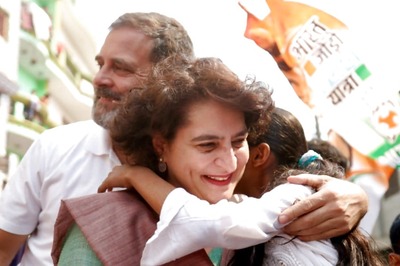
views
Amid the deteriorating condition of air quality in Delhi and other neighboring states, AIIMS Director Dr Randeep Guleria has stated that pollution could lead to more severe cases of Covid-19 infection in the coming days. Explaining the same, he said pollution affects respiratory health, especially to those who have lung and asthma issues.
Expressing concern about the possible worrisome situation in the future, Dr Guleria said both air pollution and coronavirus affect the lungs and could worsen the patient’s condition, at times resulting in death.
LIVE UPDATES: Delhi’s AQI in ‘Severe’ Category for Day 3 as Capital Remains Engulfed in Smog
In an exclusive interview with ANI, Dr Guleria, “Respiratory problem is not the only concern during this period. Patients who have a cardiovascular issue, especially those who have underlying lung disease people with chronic bronchitis, COPD, or asthmatic patient also face breathing problems and they have to depend on a nebulizer or the usage of inhaler goes up sharply. So it could lead to worsening of underlying respiratory diseases.”
Referring to two data that support the claim that pollution affects Covid-19 patients severely, he said, “One data suggests that the virus may stay in the air for a longer period when the pollutants are present in the air, turning the disease into the airborne disease. While the other data which has been analysed during the SARS outbreak in 2003 says that pollution causes inflammation and swelling in the lungs. Research from the SARS outbreak in 2003 in countries like the US and Italy has shown that the areas with higher levels of pollution impact those previously affected by Covid-19, causing inflammation and lung damage. The combination of pollution and Covid-19 could lead to higher fatality rates.”
LIVE UPDATES: India Reports 10,853 New Infections, 526 Deaths in Last 24 Hours
Asserting that air pollution also affects children’s health, he told ANI, “Before Covid-19, we had done a study on the number of admissions in emergency wards. We had found that whenever the pollution level is high, the patients, especially children, get admitted to emergency wards complaining about the respiratory problem.”
Dr Guleria suggested people wear masks and avoid going to places where the air quality is severe. He said that people should avoid going out for a morning walk when the pollution level is high.
Even after three days of Diwali, Delhi continued to suffer as the air quality remained in the ‘severe’ category with Air Quality Index (AQI) at 436, said System of Air Quality & Weather Forecasting & Research (SAFAR).
The air quality in the national capital improved slightly on Saturday due to higher wind speeds, which are expected to clear out pollutants in the air over the next two days, weather experts said. According to Central Pollution Control Board’s (CPCB) Sameer app, the city’s AQI stood at 449 in the ‘severe’ category at 8 am on Saturday. It was 462 on Friday.
An AQI between zero and 50 is considered ‘good’, 51 and 100 ‘satisfactory’, 101 and 200 ‘moderate’, 201 and 300 ‘poor’, 301 and 400 ‘very poor, and 401 and 500 ‘severe’. Due to the rampant bursting of crackers on Diwali on Thursday despite restrictions in place, the air quality in Delhi was the poorest in five years post the festival with the rise in incidents of stubble burning in neighboring states.
Read all the Latest India News here



















Comments
0 comment